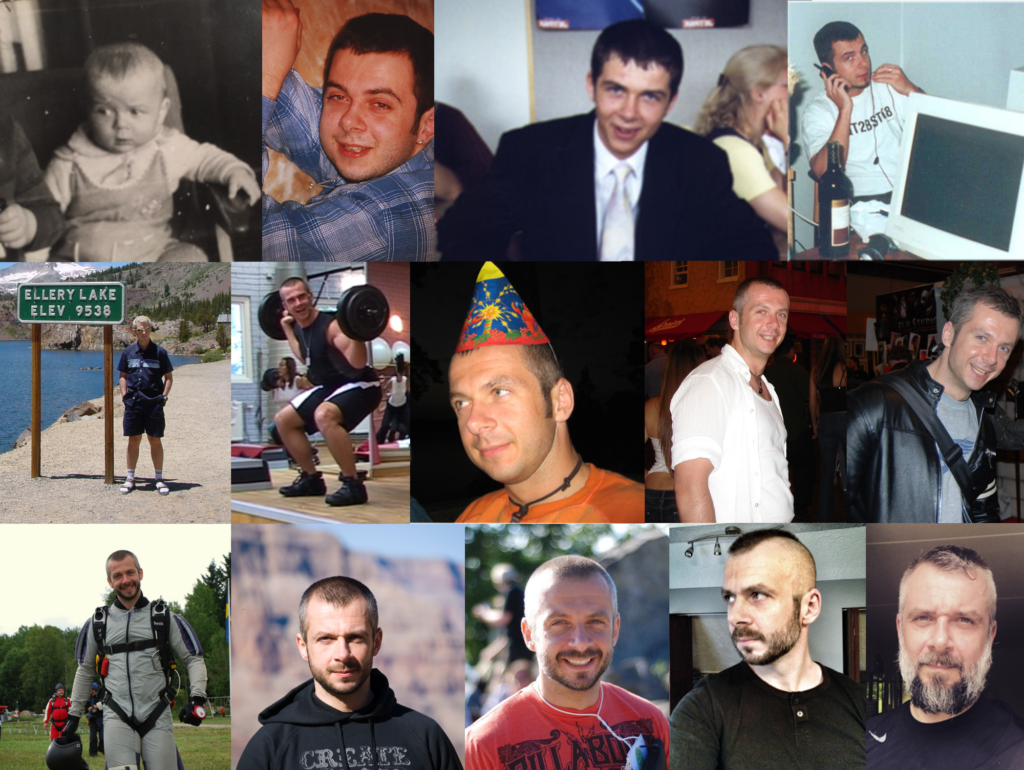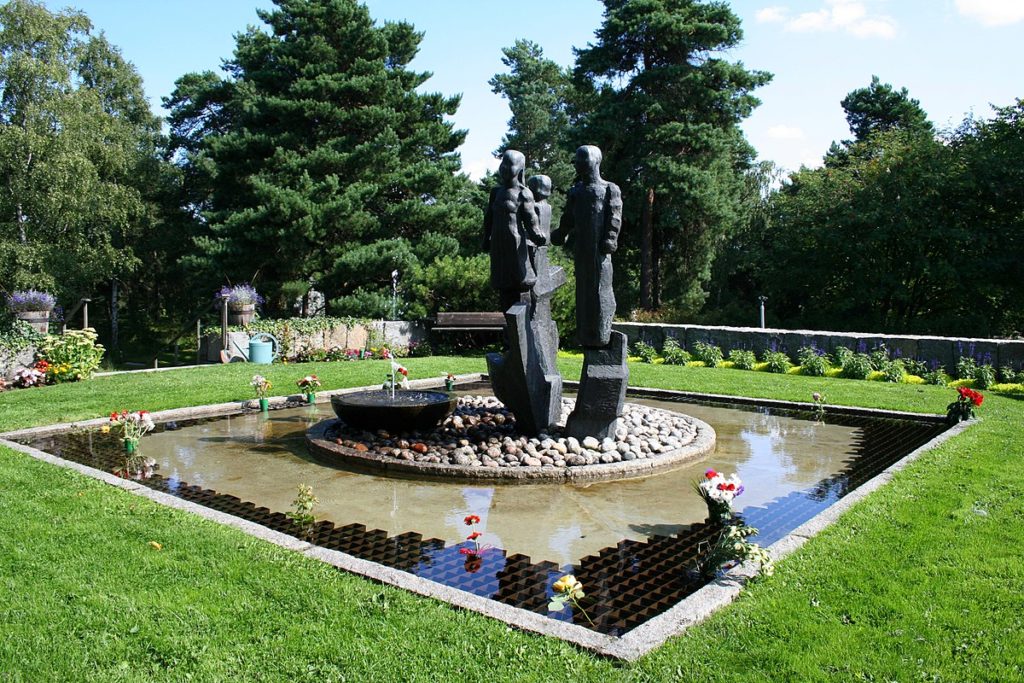Transcript of the episode:
So, you’re here despite the dangers? Good for you! If you have no clue what I’m talking about, I recommend you listen to the first episode. Or be a daredevil and don’t, it’s up to you.
Let’s continue down the rabbit hole, and find out where – and if – it ends, shall we? I think you may have an important question: who am I?
I’ve pondered that question a lot ever since I was born. It started with realizing that whenever I met people at, say, at a party, and they asked me “what do you do?” I almost always started the answer with “I am …” and then stated whatever title or position I held at the time. Had you met me two years ago and asked that question, I would most likely have answered “I am the head of innovation at a communications agency”. It’s absurd, really, that our job titles are not only what we do, they are who we are. But if I’m not my job title, then what am I? I could say that I’m a son, a brother, a friend, a husband (we’re not married yet, but English doesn’t have a good word that fits between boyfriend and husband. Swedish does: sambo. It’s short for “samboende”, which means living together. It’s not only a practical word, it’s also a legal term. You legally become sambo after living together for six months. It entails more rights and obligations than being partners, but fewer rights and obligations than being married. If I have to describe my relation to the the handsome, funny, loving, smart, caring man that I’ve spent almost seven years with, I’m rounding up to husband in English.). Anyway, where was I? Oh, right, I could say that I’m a son, a brother, a friend, a husband – but those words don’t describe me. They describe my relationship to different people.
I could ask you the same question: who are you? Who are you in every context imaginable? Whether it’s in the office at 10 am on a Monday, or at the club an early Sunday morning, Thanksgiving dinner with your family, or a weekend trip to Barcelona with your friends. There is a sameness to the person you are in all those contexts, but which words do you use to describe it? You could play it safe and say “I’m a person”, but are you, really? The word “person” comes from the Latin “persona” which in turn comes from the Greek “prosopon”, which means “mask”. Persona originally meant “mask”, referring to the mask worn by actors in a play. I’m trying hard not to be a person anymore. I learned not to be one in October, when I realized that the image in my mind of my own identity, was hollow due to being a person. It was an outline drawn by every person I’ve met. It was clearly recognizable as me, but it was the collective consciousness’ image of me. They couldn’t tell me what was inside, and since I never looked, neither could I. I had spent all my life viewing myself through the eyes of the public. To avoid looking inside, I turned my attention outwards. Attention is like peeing: you simply have to aim it somewhere. Or perhaps as a flashlight without an off-button, you have to aim it somewhere, and aiming it at your face is just silly and blinds you. I aimed the flashlight at understanding the universe through information. Science. Knowledge. Learning. Whether it was through discussions, books, YouTube videos, blog posts, movies or video games. The smartphone accelerated this, offering information and stimuli even in those moments I simply had to endure before. If I had three minutes to kill, whether it was brushing my teeth or waiting in line, I would have my phone in hand. I think I was afraid of looking inside because I didn’t know how to. Or maybe I was afraid of what I could find. Waking-up is as much an awareness and exploration of my inside and my soul, as of my outside and my universe. I didn’t know who I was until that point, and now I’m starting to get an idea.
So, then
I am a man who’s born a lion
And a man who loves the chi, it calls me
I am the disciple of disbelief
We are descended from voyagers
Who found their way across the worlds
They call meThey’ve delivered me to where we are
I have journeyed fartherI am everything I’ve learned and more
Still it calls me
And the call isn’t out there at all
It’s inside me
It’s like the tide
Always falling and rising
I will carry you here in my heart, you’ll remind me
That come what may, I know the way
But you can call me Michael. Any additional answer I can give you says little, but it distorts the lens through which you see me a lot. Try it. Picture me as a shoe salesman. Or as an unemployed person. As the head of innovation at a communications agency. As a personal trainer. As a skydiver. I wonder, which preconceived notion about each of those categories popped into your head? I’ve actually been all of those, but today I am neither. In this world, the one we call “the real world”, the few words that describe me somewhat correctly are introvert, male, storyteller and explorer. Oh, and gay (like really, seriously, severely gay), but not too gay to function.

Does this sound crazy to you so far? I don’t blame you. Thirteen months ago, most of the stories I’m about to tell you would seem completely, utterly insane to me. And they are. Being born is like realizing our world is insane and an illusion, and choosing to step out of it. Going out-of-sane. In the out-of-sane reality, I’m a still a storyteller and an explorer, but I’m not so sure about the “gay and introvert” part. I am a demigod – but think less Heracles or Hercules, and more Maui from Moana. If you’re in Europe, you know that movie as Vaiana. Disney changed it because there was a semi-famous Italian pornstar named Moana, and any kids image googling “Moana” could end up finding years of therapy ahead. Anyway, In the out-of-sane, I am a demigod, the son of Alan Watts, the brother of Tom. There’s also an octopus involved, although I’m not entirely sure how yet. It’s confusing to be a newborn sometimes.
Who I am matters little, what is important is what I am, and what I am not. I am not enlightened. I do not want to be, not really. It’s a little like wanting the perfect beach body. If you ask someone who pays for a gym membership, but never actually goes to the gym, if they want the perfect beach body, chances are they’d say “of course!” and then continue never going to the gym. To them, the effort – spending several days a week at the gym – simply seems too high for the reward – a very fit body. Had the effort been worth it, they would have done it. Replace “the perfect beach body” with “enlightenment” and you have a good picture of how I feel about it: it’s not worth the effort.
Now, those of you who have that perfect beach body may think “but it’s totally worth it, if they only experienced it, they would understand!”. You are right, of course. I did that, some years back: went to the gym four to five days a week for a whole year. I had a diet as ambitious as my work-out schedule. It was totally worth it, I did get that fit body I wanted. Unfortunately, working out didn’t do much for my non-existent dating skills, and I was too poor to enjoy the more carnal, no-strings-attached aspects of a great body. Poor as in the Madonna quote “Poor is the man whose pleasures depend on the permission of another”.

No, my excuse isn’t that of the person who believes the price is too high when it really isn’t. I’ve had a really fit body, and I’ve experienced enlightenment twice. Once August last year, once a month ago. It’s awesome in the true meaning of the word. As in “it fills you with awe”. I’m not talking about the awe of Sasha Velour’s reveals in the final episode of season 9 of Rupaul’s Drag Race, genius as it was. It’s more like all your birthdays, your wedding day, your mitzvah, bar or bat, graduation day, an orgasm, your first Ecstasy kickning in during sunrise on a beach in Koh Phangan and that scene from Avatar when Sam Worthington is reborn through the tree of souls, all rolled into one single moment that lasts forever, because time ceases to exist. Another thing that ceased to exist for a while, was me.
You know what? It’s not scary to not exist. It’s actually complete and utter bliss. Of all the things I’ve told you, this is perhaps the thing that would sound most crazy to my old self. Just like most people, I was terrified of death. So terrified that I didn’t even think about it. I avoided situations where death was visible, like cemeteries. I actually would go out of my way to avoid a cemetery on the morning walks I took in addition to the gym, you know, to get that great body. The cemetery was actually quite beautiful. Instead I chose to walk along a busy road with buildings that would make Easter Europe seem cheerful. It’s quite the symptomatic behavior: I avoided beauty because of death, and I ended up living less.

As I was ready to face my fear of death, I realized that it’s not actual death I was afraid of. It was not existing.
Fears are interesting that way, that they often pretend to be something else. They mr. Ripley you with all their talent, and so fear of being abandoned may disguise itself as fear of conflict.
I thought I was afraid of conflicts most of my life, when I really was afraid of being abandoned. I was so deceived by my fear of abandonment that I didn’t even realize that I did take conflicts – with people I didn’t much care about. Since I believed I was afraid of conflict, I didn’t realize that I went Eric Cartman all over people who didn’t matter, and therefore could not abandon me. Only once my best friend pointed that out in a joint effort with my husband, only then could I start looking for the real reason I avoided conflicts with my family, my close friends – and my husband. I avoided conflict because I was afraid of losing their love. I didn’t realize that when you avoid conflict, you also avoid growth. It is sinister, that fear of losing love, because it also stops love from growing. There can be no growth without risk, just like there can be no life without death.
My fear of death was similar. It was a little like the plot from Friday the 13th, where you think Jason is the killer, when it’s really his mom. The mom of my Jason was “not existing”. That was what I was afraid of.
It’s logical, right? When you die, you stop existing – and to someone who exists, that is a horrible concept. I knew that once I don’t exist, I cannot care, but it seemed too simple an answer. Like a trap. I think it was because deep down (deep, deep, deep down, like, that place in your intestines that they don’t know if it’s better to insert the scope through your anus or your mouth to reach it) – deep down I did not believe in non-existence for life. Once I realized what my fear really was, I could ask myself that hard question: “Well, what do I really believe?”
It’s time to say good night, so I will leave you with that question until our next encounter. What do you really believe? Think about that. Children think about that. Sleep well, my friend, until you wake up.